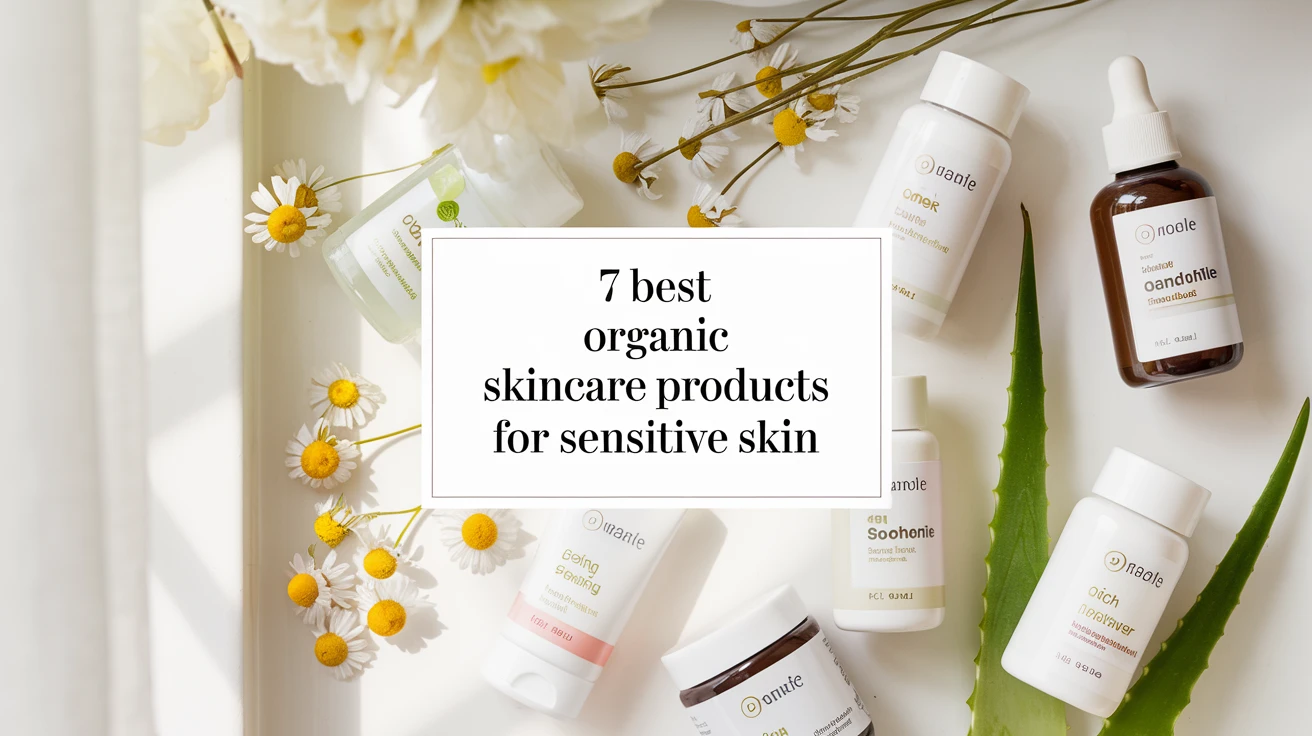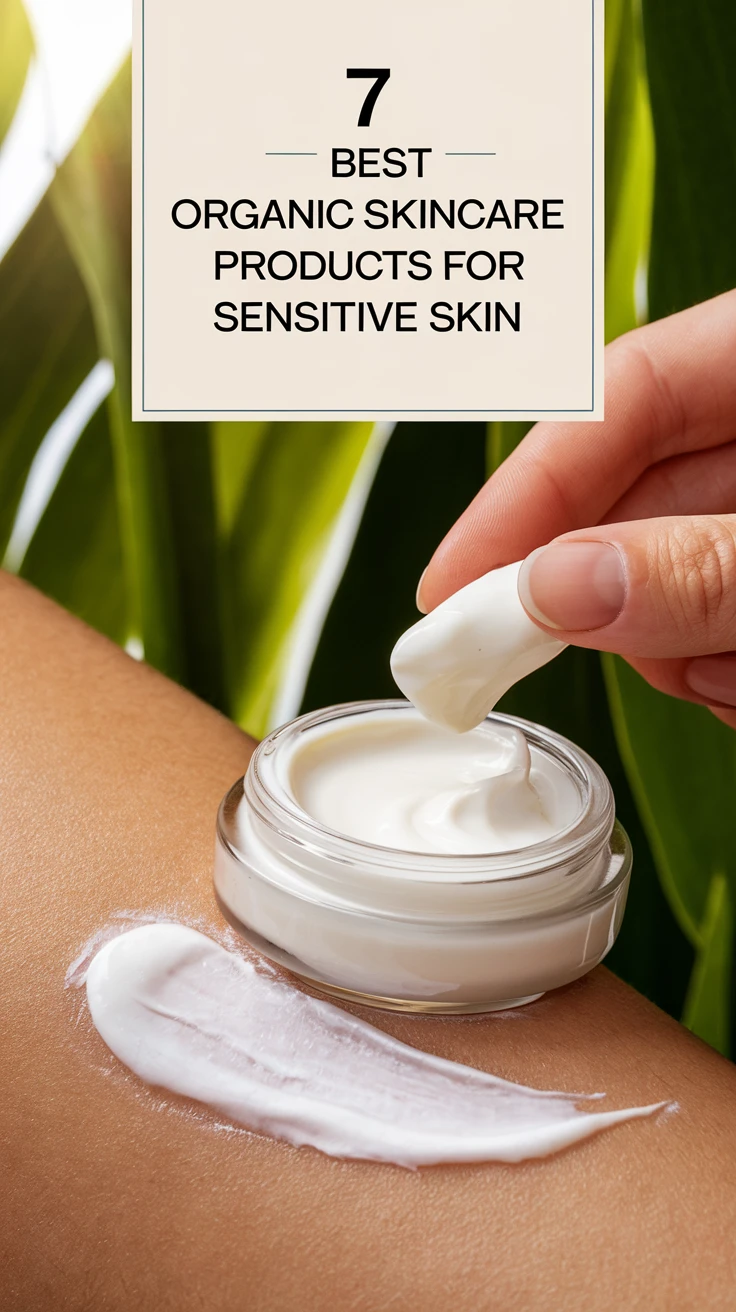
Living with sensitive skin can feel like walking through a minefield of potential reactions. One day your skin is calm and happy, and the next, it’s red, irritated, and uncomfortable – all because you tried that new “miracle” product everyone’s raving about. I’ve been there, and it’s what led me down the path of discovering organic skincare. After years of trial and error (and more than a few reactive episodes), I’ve learned that when it comes to sensitive skin, organic products often provide the gentle care we need. Today, I’m sharing my carefully researched and personally tested list of the best organic skincare products that won’t send your sensitive skin into a tailspin.
The Truth About Gentle Organic Cleansers
The foundation of any skincare routine starts with a good cleanser, and for sensitive skin, this step is crucial. I learned this the hard way after using a harsh conventional cleanser that left my skin barrier compromised for weeks. Organic cleansers, particularly those with minimal ingredients, can effectively clean without stripping your skin.
What to Look For in an Organic Cleanser
| Beneficial Ingredients | Ingredients to Avoid |
|---|---|
| Chamomile | Sodium Lauryl Sulfate |
| Aloe Vera | Artificial Fragrances |
| Green Tea | Alcohol |
| Calendula | Harsh Preservatives |
Look for cream or oil-based cleansers that maintain your skin’s natural pH balance. The best ones contain soothing ingredients like chamomile or calendula, which have natural anti-inflammatory properties. Remember to always cleanse with lukewarm water – hot water can trigger sensitivity.
Natural Toners That Won’t Irritate
Toners have gotten a bad rap over the years, mainly because traditional formulations were loaded with alcohol and harsh astringents. However, organic toners can be a game-changer for sensitive skin when formulated correctly. They help balance pH levels and prepare your skin for the rest of your routine.
Benefits of Natural Toners
- Restore skin’s natural pH balance
- Provide gentle hydration
- Remove any remaining impurities
- Calm and soothe irritated skin
- Enhance absorption of other products
I particularly recommend looking for toners containing rose water, cucumber extract, or witch hazel (alcohol-free). These ingredients provide natural astringent properties without causing irritation. Apply using gentle patting motions rather than wiping to minimize friction on sensitive skin.
Soothing Organic Moisturizers
Finding the right moisturizer for sensitive skin can feel like searching for a needle in a haystack. The key is looking for products with minimal, yet effective ingredients. After trying countless options, I’ve found that the best organic moisturizers focus on barrier repair and hydration.
Moisturizer Application Guide
| Time of Day | Type of Moisturizer | Key Ingredients |
|---|---|---|
| Morning | Light, fast-absorbing | Hyaluronic Acid, Aloe |
| Evening | Rich, restorative | Shea Butter, Ceramides |
| As Needed | Calming mask | Oatmeal, Honey |
The most effective organic moisturizers I’ve found contain ingredients like shea butter, jojoba oil, and ceramides. These ingredients mimic your skin’s natural moisture barrier and help repair any damage.
Pure Face Oils for Sensitive Skin
Don’t let the word “oil” scare you away. Face oils can be a sensitive skin’s best friend when chosen correctly. The trick is selecting oils that closely match your skin’s natural sebum composition.
Best Organic Facial Oils
- Jojoba Oil: Most similar to human sebum
- Rosehip Oil: Rich in vitamins and antioxidants
- Marula Oil: Lightweight and non-comedogenic
- Evening Primrose Oil: Anti-inflammatory properties
- Camellia Oil: Gentle and deeply nourishing
Apply oils as the last step in your evening routine, using gentle pressing motions. Less is more – start with 2-3 drops and adjust as needed.
Gentle Face Masks That Actually Work
Face masks can be tricky for sensitive skin, but organic options often provide the perfect balance of treatment and gentleness. The key is choosing masks with simple, food-grade ingredients that you could theoretically eat (though I don’t recommend it!).
DIY Organic Mask Recipes
| Skin Concern | Ingredients | Duration |
|---|---|---|
| Redness | Oatmeal + Honey | 15 minutes |
| Dryness | Avocado + Aloe | 20 minutes |
| Irritation | Cucumber + Yogurt | 10 minutes |
Eye Creams for Delicate Skin
The skin around our eyes is significantly thinner and more sensitive than the rest of our face. This makes choosing the right organic eye cream crucial. Look for products with minimal ingredients and specific eye-area benefits.
Essential Eye Cream Features
- Fragrance-free formulation
- Light texture that absorbs quickly
- Cooling applicator (if possible)
- Natural brightening ingredients
- Gentle hydrating compounds
Safe Organic Sunscreen Options
Sunscreen is non-negotiable, but finding one that doesn’t irritate sensitive skin can be challenging. Mineral-based organic sunscreens are your best bet, as they sit on top of the skin rather than being absorbed into it.
Choosing the Right Sunscreen
| Type | Pros | Cons |
|---|---|---|
| Zinc Oxide | Immediate protection, soothing | May leave white cast |
| Titanium Dioxide | Lightweight, good for daily use | Slightly less UVA protection |
| Mixed Mineral | Broad spectrum protection | Can be more expensive |
Conclusion
Transitioning to organic skincare products can be a game-changer for sensitive skin. Remember that everyone’s skin is different, so what works for one person might not work for another. Always patch test new products, introduce them one at a time, and listen to your skin’s needs. With patience and the right organic products, you can achieve healthy, happy skin without the worry of irritation.
Key Takeaways
- Always patch test new products, even organic ones
- Look for products with minimal, recognizable ingredients
- Introduce new products one at a time
- Pay attention to seasonal skin changes
- Document reactions to identify triggers
Frequently Asked Questions
How long should I patch test organic skincare products?
It’s recommended to patch test for at least 24-48 hours, even with organic products. Apply a small amount behind your ear or on your inner arm and watch for any reactions.
Can organic skincare products expire?
Yes, organic products can expire and often faster than conventional ones due to fewer preservatives. Always check expiration dates and watch for changes in color, smell, or texture.
Is “organic” the same as “natural” in skincare?
No, “organic” means ingredients are grown without synthetic pesticides and fertilizers, while “natural” simply means derived from nature but doesn’t guarantee organic cultivation.
Can I be allergic to organic ingredients?
Yes, absolutely. Natural and organic ingredients can still cause allergic reactions. Common allergens include essential oils, certain plant extracts, and even natural fragrances.
How often should I use organic face masks?
For sensitive skin, start with once a week and adjust based on your skin’s response. Some gentle masks can be used twice weekly if your skin tolerates them well.
Should I refrigerate my organic skincare products?
Some products may benefit from refrigeration, especially those without preservatives. Check the product instructions, but generally, eye creams and facial mists can be refrigerated for added cooling benefits.
Can I mix different organic skincare brands?
Yes, you can mix brands, but introduce products slowly and ensure their ingredients complement each other. Watch for any reactions when combining products.
How long does it take to see results with organic skincare?
Generally, allow 4-6 weeks to see significant results. Sensitive skin often takes longer to adjust to new products, even organic ones.
Are more expensive organic products better?
Not necessarily. Price doesn’t always indicate quality. Focus on ingredient lists and how your skin responds rather than the price tag.
Can I make my own organic skincare products?
Yes, but be cautious. While DIY skincare can be effective, it’s important to research ingredients thoroughly and maintain proper hygiene in preparation and storage.


